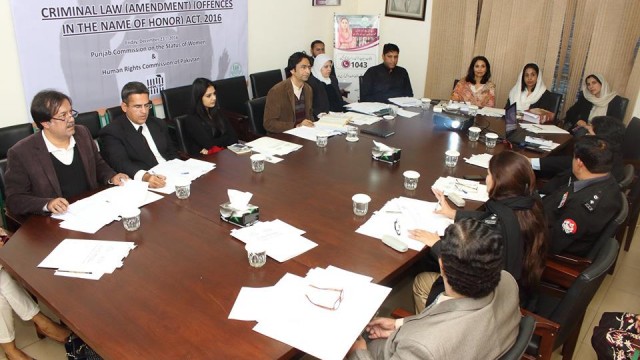PCSW Urges Police And Prosecution To Increase Convictions For Honour Crimes Through New Criminal Law (Amendment) (Offences In The Name Or Pretext Of Honour) Act 2016
Friday, December 23rd – Punjab Commission on the Status of Women (PCSW) and Human Rights Commission of Pakistan conducted a consultation with legal experts, lawyers, civil society, prosecutors and senior officials of Punjab police, on the Criminal Law (Amendment) (offences in the name or pretext of honor) Act 2016. The objective of the meeting was to discuss the implication of Criminal Law Amendment Act 2016 on the prosecution and conviction of perpetrators of ‘honour’ crimes. Ms. Fauzia Viqar (Chairperson, PCSW) chaired the meeting and notable guests included Mr. I.A. Rehman (Secretary General, HRCP), Ms. Khawar Mumtaz (Chairperson, National Commission on the Status of Women), Ms. Uzma Chughtai (Director General, Punjab Judicial Academy), Mr. Ahmad Ishaque Jehangir (DIG, Research and Development, Punjab Police), Mr. Rana Muhammad Anwar (AIG Legal), Ms. Shaheen Khalid (Additional Director, CPO), Mr. Asad Jamal (human rights activist and lawyer), Mr. Imran Qureshi (Senior Legal Executive, PCSW Women’s Helpline), Ms. Rabbiya Bajwa (Advocate Supreme Court), Mr. Khurrum Khan, Mr. Qadir Bari (Punjab Criminal Prosecution Service), and Ms. Reema Omer (International Commission of Jurists). Senior surgeon medico-legal, Dr. Waseem Haider from Punjab Forensic Science Agency also attended the consultation and gave forth his valuable views.
Chairperson PCSW shared figures on honour crimes from Punjab, which consistently show an increase in the number of honour killings each year. Notably, the joint session of Parliament attempted to remove lacunae in the existing provisions of the Pakistan Penal Code 1860 and the Code of Criminal Procedure 1898, by enacting some new provisions, and amending others, to ensure that a ‘compromise’ cannot be reached between the parties and the perpetrators are punished as per law. However, Mr. Asad Jamal shared that a significant number of cases of ‘honour’ crimes continue to be ‘compromised’ since perpetrators are members of the victim’s own family. This makes criminal prosecution impossible. Mr. Khurrum Khan furthered this argument and stated that the main reason for non-prosecution is lack of evidence and insufficient investigation by the investigation officers (IOs). Participants agreed that there is a need to emphasize and spread awareness regarding sentencing in ‘honour’ crimes as that would help us deter the occurrence of offences committed in the name of ‘honour’ and would further send a signal to the public at large about the state’s zero tolerance policy in such matters.
Participants agreed that effective measures need to be taken to ensure elimination of physical violence committed in the name of ‘honour’ and that the performance of police and other law enforcement departments needs to be improved in this regard. Furthermore, Ms. Uzma Chugtai informed the attendees that Punjab Judicial Academy is conducting trainings for the sensitization of lower and superior judiciary, while Ms. Shaheen Khalid also stated that police officials are regularly being trained on criminal laws for women protection.
All participants reinforced the need for reliable data on all kinds of violence against women, specifically for crimes committed in the name of honor. Coordination and multi-sectoral measures for monitoring of individual cases were discussed at length. Furthermore, participants agreed that in order to improve prosecution and conviction rates for perpetrators of honour crimes, all stakeholders must cooperate with each other. Police officials also informed the attendees that standard operating procedures (SOPs) for treatment and trial of female victims of violence were being implemented widely across Punjab. They stressed on the presence of female police officers at help desks in police stations across Punjab, and advised all participants to widely publicize this mechanism for women’s safety. DIG Legal informed the attendees that a comprehensive law on witness protection mechanisms is currently being drafted to specifically cater to honour crimes, since a major problem encountered in prosecution relates to the credibility of witnesses who are sometimes the only form of evidence available.


